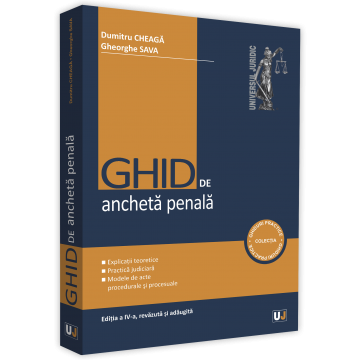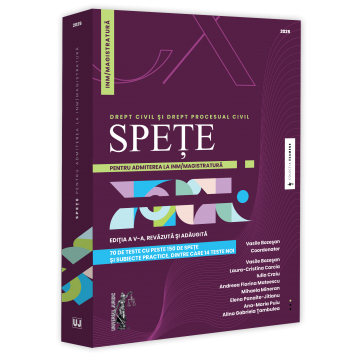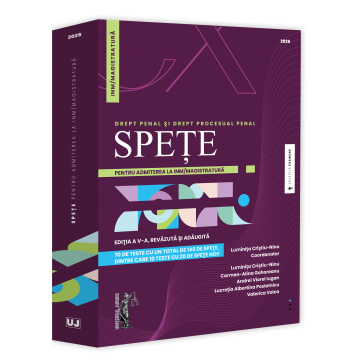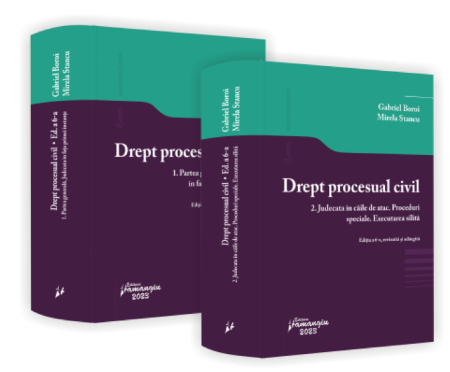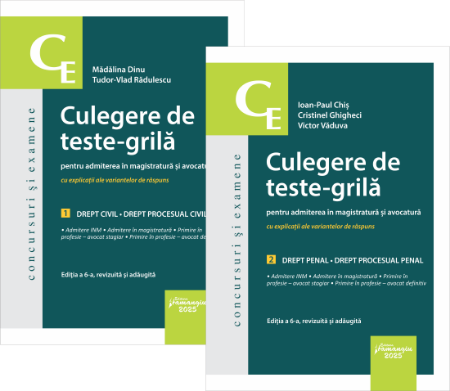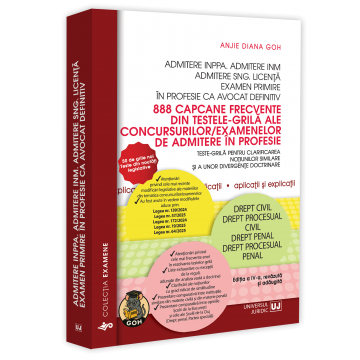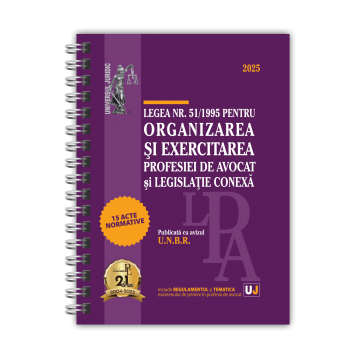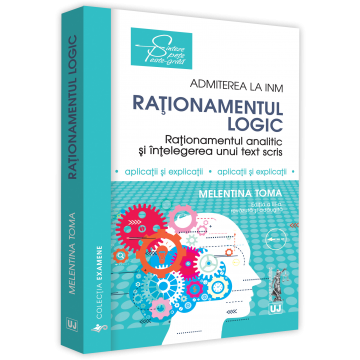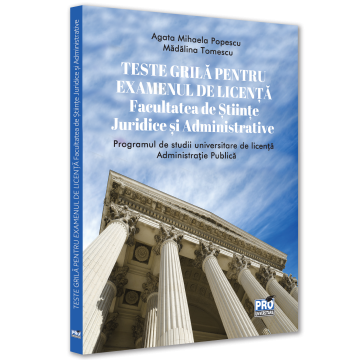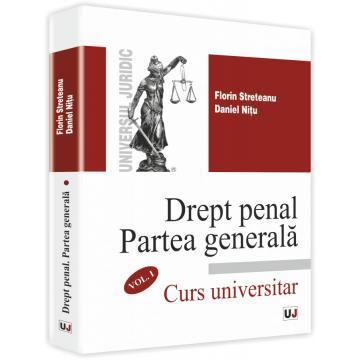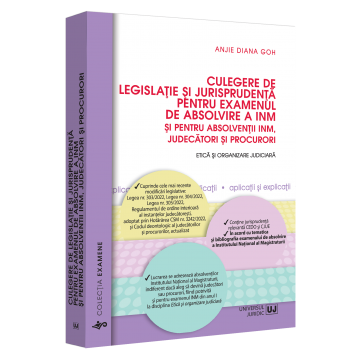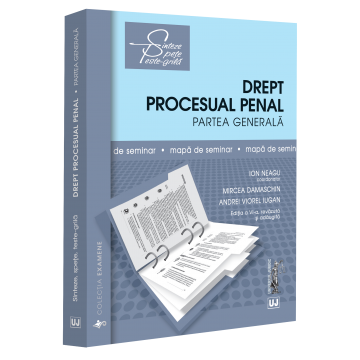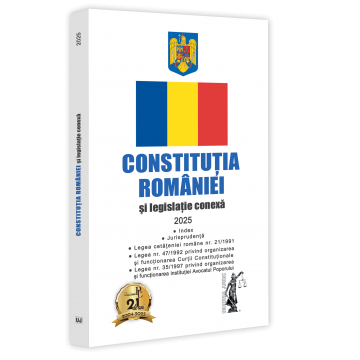6359.png) ECHR decisions in the cases against Romania - 2010 - Analysis, consequences, potentially responsible authorities (Volume VI)
ECHR decisions in the cases against Romania - 2010 - Analysis, consequences, potentially responsible authorities (Volume VI)
6359.png)
ISBN: 978-606-591-166-6
Publisher year: 2011
Edition: I
Pages: 672
Publisher: Editura Universitară
Author: Dragos Calin, Elena Blidaru, Mihaela Vasiescu, Cristina Radu, Florin Mihaita
- Description
- Authors
- Reviews (0)
After numerous convictions of Romania, public opinion was sent to a specific security, by politicians, the press or by representatives of public authorities, the idea that judges sole blame of these convictions, of course, being the last link in the causation plan before sending a case before the European Court of Human Rights. Such opinion is based on speculative arguments and not on thorough scientific research.
In this work we aimed to summarize each case in which Romania was condemned by the European Court of Human Rights, to find potential authorities responsible in any way necrutand judiciary, and observe to what extent they have complied and reacted specifically after rulings.
Practical utility of the present collection of case law is that all decisions are handled by the European Court convictions in cases against Romania on 1 January 2010 until 31 December 2010, including those published in the Official Gazette and those for that there has been an unofficial translation that those interested can have access.
Summarizing decisions and extract relevant arguments the Court's reasoning, with the risk taken to affect - the slightest - the accuracy of the original text is still an advantage because the collection in a short time to browse the entire ECHR jurisprudence and is a useful tool in the library of any theoretical or practitioner of law, whose goal it serves and how it was conceived by keyword indexing, with reference to all relevant causes since 2010.
Last but not least, the reasons stated in each case analysis of potential responsible authorities, although emanating from the authors collection, but the European Court assessments, is a landmark for the work required, by virtue of office or profession, to meet or ensure legal rights and fundamental freedoms. Therefore, it was not omitted any law evolution, positive or negative, indicating authors - where they were identified - the consequences of the decision, you should use the interest to reveal the current internal remedies.
The purpose of this study and the methodology chosen just went from a very careful analysis of the facts, to motivate each resolution passed by the European Court of Human Rights on the merits, to identify the mechanism that ultimately led to the violation of the fundamental right concerned.
Thus, we have available, in a scientific and unbiased approach, conclusions and evidence of convictions of Romania to the European Court of Human Rights.
Thank you judge Mr. Michael Udroiu, who prefaced his work through the eyes of great experience and overview of the whole phenomenon.
The authors
Convention (European) for Human Rights and Fundamental Freedoms and the European Court of Human Rights (hereinafter ECHR) in the interpretation and application is the central structure of any judicial system. On the one hand, the legislature must take into account European standards of human rights protection in the process of drafting and adopting laws. Similarly, business executive power in implementing the laws, ordinances or adopt simple or emergency, and other administrative acts must align the rights and guarantees established in the jurisprudence of the European court litigation. On the other hand, national courts, law enforcement officials or other institutions of the Member States of the Council which operates in civil and criminal justice should ensure that fundamental human rights and freedoms guaranteed to be effective.
Overall knowledge of jurisprudence C.E.D.O. became, therefore, an imperative for all the Romanian authorities in order to avoid violation of fundamental human rights, the state likely to attract condemnation by the court in Strasbourg.
In this context, decisions against Romania by the ECHR the priority of zero degree in all state structures to address emergency situations that have caused violations of human rights violations.
Preface that the book describes and analyzes the decisions of the ECHR in Case against Romania in 2010, continuing significant effort of the author of five previous books devoted to the same topic, but with reference to the years 1994 to 2009.
Developed by a team of magistrates who are passionate about human rights, but also concerned about the impact of the decisions of the Strasbourg Court, the paper presents first, a faithful translation of legal terms, the judgments of the ECHR in civil and criminal proceedings against Romania in 2010, thus ensuring both the detailed knowledge of the facts, as well as various issues considered by the European court.
Further, the authors analyze the structure and systematic violations of human rights issues in civil and criminal jurisprudence by referring both previous ECHR and the latest comments published in magazines doctrinal European human rights in relation to decisions studied, which gives held a special scientific work.
The fruit of this approach is not only clarify issues gnosiological studied, and identify the authorities responsible for fundamental rights violations found by the ECHR For example, if in civil jurisprudence, the authors find fault both legislative power in relation to the lack of predictability of legal norms or the lack of mechanisms provided by law in order to unify the practice, but also fault the judiciary that has failed to provide uniform practice, affecting confidence in the judiciary, that trust is an essential element of any rule of law. Looking ahead, the authors discloses practice unification mechanism provided in the new Civil Procedure Code, the complaint through the High Court of Cassation and Justice for a ruling prior to absolution of law issues.
Form neat and clear expression of ideas makes his work is not only useful but also a pleasant read, constituted a landmark in the literature dedicated to protecting the human rights field.
In conclusion, the authors consider that the scientific approach results in a valuable tool in the protection of Human Rights and Fundamental Freedoms and is, along with the five previous volumes, required reading for representatives of the legislative, executive and judiciary so until the advent of new codes, as well as afterwards.
Judge Michael Udroiu
Mihaela Vasiescu
Judge, Court of Appeal Targu Mures
Cristina Radu
Judge, Court of Constanta
Elena Blidaru Judge, Court of Sector 1 Bucharest
Florin Mihaita
Judge, Court of Sector 4 Bucharest

![ECHR decisions in the cases against Romania - 2010 - Analysis, consequences, potentially responsible authorities (Volume VI) [1] ECHR decisions in the cases against Romania - 2010 - Analysis, consequences, potentially responsible authorities (Volume VI) [1]](https://gomagcdn.ro/domains/editurauniversitara.ro/files/product/large/hotararile-cedo-in-cauzele-impotriva-romaniei-2010-analiza-consecinte-autoritati-potential-responsabile-volumul-vi-2030-792999.jpg)
